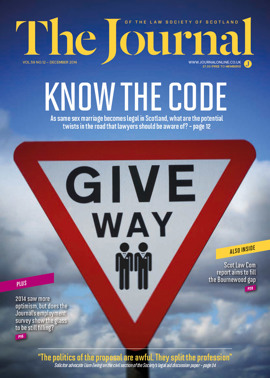Not proven no more?
Submissions to Lord Bonomy’s Post-corroboration Safeguards Review closed with both the Society and the Faculty of Advocates suggesting that if corroboration goes, the not proven verdict should follow. The Society took a different position in relation to the proposed member’s bill at Holyrood that would abolish the verdict, but now adopts Professor Chalmers’ position that it is “undesirable in principle to have two different verdicts of acquittal when the difference between them cannot be properly articulated”. The Faculty also founds on the illogicality of the present system and the risk of jury confusion.
JUSTICE Scotland, however, argues that: “To remove another aspect of the patchwork of protections from accused persons at the same time would, at best, produce uncertainty about the fairness of future proceedings. At worst, it would increase the risk of miscarriages of justice... there may be a particular alchemy in the present system of safeguards which helps to ensure a fair trial.” So much change at one go, without research into the impact, “might be regarded as reckless”, it adds.
The Society of Solicitor Advocates (SSA) took a similar line, saying that Scotland had “developed a blend of safeguards which seem to have worked. It would be extremely risky simply to abandon some of the key safeguards in the mere hope that fair outcomes would not be prejudiced”.
Both professional bodies also support a reduction in jury size to 12, whereas JUSTICE and the SSA state that it is for those proposing such a change to demonstrate that fairness would not suffer. They are closer as respects majority verdicts, however: the Society and Faculty propose a minimum 10 out of 12, while JUSTICE supports an 80% vote for guilty (12 out of 15). The SSA does not express a view on this, preferring that a jury should attempt unanimity.
While supporting the various safeguards proposed by Lord Bonomy, the Society continues to press the case for a full review of the law. It records its concern “that, without proper consideration of the corroboration requirement, and its interconnection with such safeguards, the integrity of Scots criminal law and its distinction may be compromised by simply borrowing safeguards from other jurisdictions without proper regard being given as to how our system has developed and operates at present”.
The full Society and Faculty responses are available on their respective websites.
In this issue
- Factors in the balance
- Balancing the right to decide
- Life yet in oil and gas
- Commercial awareness begins at trainee stage
- Relocation and the finances of contact
- Reading for pleasure
- Opinion: Archie Maciver
- Book reviews
- Profile
- President's column
- Up and running at last
- People on the move
- With this Act, I thee wed
- Tax: a mission to inform
- For better, for worse
- Filling the Bournewood gap
- Power talking
- For whose aid?
- Balanced view
- A laughing matter?
- Directors: how much is too much, or not enough?
- Credit where it's due?
- New age, new image, new media, continuing problems?
- Scottish Solicitors Discipline Tribunal
- Lawyers as leaders
- Property Law Committee update
- Property Standardisation Group update
- Over the finishing line – 2
- Not proven no more?
- Vulnerable clients guidance now extended to the young
- From the Brussels office
- Take it to the schools
- A future – a vision
- Ask Ash
- A strategy with legs?
- Who's got what it takes?
- I can act, but should I?
- Prominence unplanned






